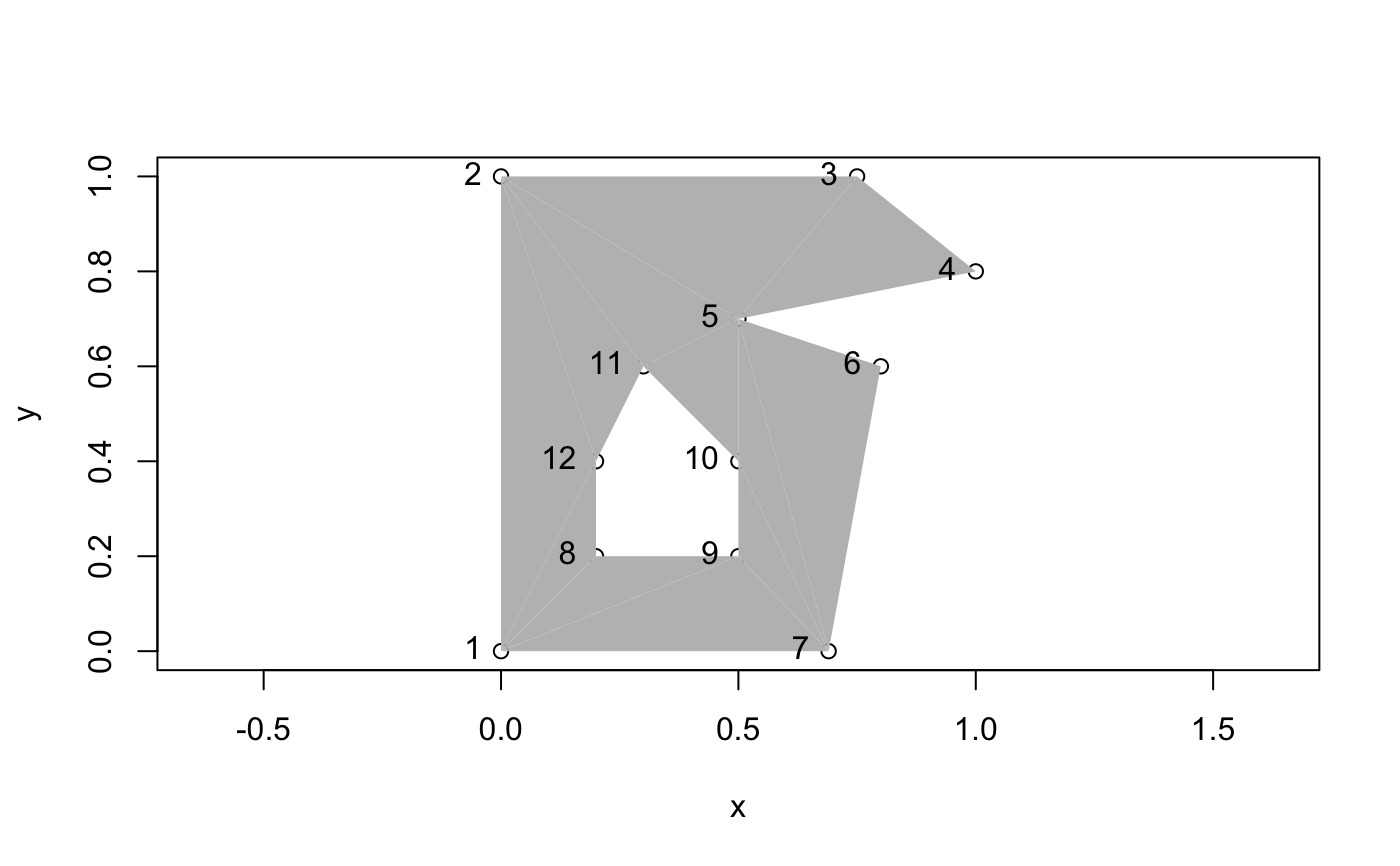Produce a triangulation index into x,y coordinates of a polygon
that may include holes. Holes are specified by input argument holes
which marks the starting index of each hole, if any.
earcut(xy, holes = 0, ...)
# Default S3 method
earcut(xy, holes = 0L, ...)Arguments
Value
integer vector of triangle index, in sets of three
Details
Triangles are returned in counter-clockwise orientation, a common convention that ascribes a positive area to the triangle. (Orientation may be collinear or numerically ambiguous and so may be undetermined).
Ear cutting (or ear clipping) applies constrained triangulation by successively 'cutting' triangles from a polygon defined by path/s. Holes are supported, the earcut library works with single-island-with-holes polygons, analogous to the POLYGON type in simple features.
To understand the specification of holes, see the examples with comment starting "1) Notice how the hole begins ..." in relation to the example code.
See also
plot_ears
Examples
## single ring polygon
x <- c(0, 0, 0.75, 1, 0.5, 0.8, 0.69)
y <- c(0, 1, 1, 0.8, 0.7, 0.6, 0)
(ind <- earcut(cbind(x, y)))
#> [1] 2 1 7 7 6 5 5 4 3 2 7 5 5 3 2
plot_ears(cbind(x, y), ind)
 ## polygon with a hole
x <- c(0, 0, 0.75, 1, 0.5, 0.8, 0.69,
0.2, 0.5, 0.5, 0.3, 0.2)
y <- c(0, 1, 1, 0.8, 0.7, 0.6, 0,
0.2, 0.2, 0.4, 0.6, 0.4)
ind <- earcut(cbind(x, y), holes = 8)
plot_ears(cbind(x, y), ind)
## polygon with a hole
x <- c(0, 0, 0.75, 1, 0.5, 0.8, 0.69,
0.2, 0.5, 0.5, 0.3, 0.2)
y <- c(0, 1, 1, 0.8, 0.7, 0.6, 0,
0.2, 0.2, 0.4, 0.6, 0.4)
ind <- earcut(cbind(x, y), holes = 8)
plot_ears(cbind(x, y), ind)
 ## 1) Notice how the hole begins at index 8,
## hence holes = 8 above, and holes = c(8, 13) below
plot_ears(cbind(x, y), ind, col = "grey", border = NA)
text(x, y, labels = seq_along(x), pos = 2)
## 1) Notice how the hole begins at index 8,
## hence holes = 8 above, and holes = c(8, 13) below
plot_ears(cbind(x, y), ind, col = "grey", border = NA)
text(x, y, labels = seq_along(x), pos = 2)
 ## add another hole
x <- c(0, 0, 0.75, 1, 0.5, 0.8, 0.69,
0.2, 0.5, 0.5, 0.3, 0.2,
0.15, 0.23, 0.2)
y <- c(0, 1, 1, 0.8, 0.7, 0.6, 0,
0.2, 0.2, 0.4, 0.6, 0.4,
0.65, 0.65, 0.81)
ind <- earcut(cbind(x, y), holes = c(8, 13))
plot_ears(cbind(x, y), ind, col = "grey")
## add another hole
x <- c(0, 0, 0.75, 1, 0.5, 0.8, 0.69,
0.2, 0.5, 0.5, 0.3, 0.2,
0.15, 0.23, 0.2)
y <- c(0, 1, 1, 0.8, 0.7, 0.6, 0,
0.2, 0.2, 0.4, 0.6, 0.4,
0.65, 0.65, 0.81)
ind <- earcut(cbind(x, y), holes = c(8, 13))
plot_ears(cbind(x, y), ind, col = "grey")
 # simpler shape with more than one hole
# the two inside holes are open to each other
# (so we can use the same data for one hole or two)
x <- c(0, 0, 1, 1,
0.4, 0.2, 0.2, 0.4,
0.6, 0.8, 0.8, 0.6
)
y <- c(0, 1, 1, 0,
0.2, 0.2, 0.4, 0.4,
0.6, 0.6, 0.4, 0.4
)
ind <- decido::earcut(cbind(x, y), holes = c(5, 9))
plot_ears(cbind(x, y), ind, col = "grey")
# simpler shape with more than one hole
# the two inside holes are open to each other
# (so we can use the same data for one hole or two)
x <- c(0, 0, 1, 1,
0.4, 0.2, 0.2, 0.4,
0.6, 0.8, 0.8, 0.6
)
y <- c(0, 1, 1, 0,
0.2, 0.2, 0.4, 0.4,
0.6, 0.6, 0.4, 0.4
)
ind <- decido::earcut(cbind(x, y), holes = c(5, 9))
plot_ears(cbind(x, y), ind, col = "grey")
 plot_holes(cbind(x, y), holes = c(5, 9), col = "grey")
plot_holes(cbind(x, y), holes = c(5, 9), col = "grey")
 ind <- decido::earcut(cbind(x, y), holes = 5)
plot_ears(cbind(x, y), ind, col = "grey")
ind <- decido::earcut(cbind(x, y), holes = 5)
plot_ears(cbind(x, y), ind, col = "grey")
 plot_holes(cbind(x, y), holes = 5, col = "grey")
plot_holes(cbind(x, y), holes = 5, col = "grey")
